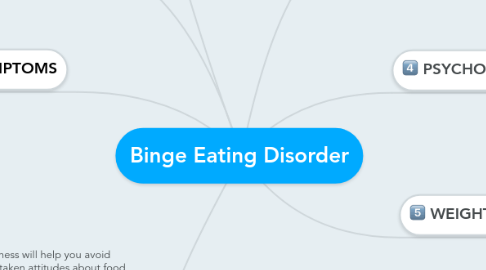Binge Eating Disorder
作者:Lynn Miedzik

1. FOOD-RELATED SYMPTOMS
1.1. Over-eating (eating until uncomfortably full)
1.2. "Trigger Foods"(differ from person-to-person)
1.3. Secretive and "shameful" binging
2. PSYCH-RELATED SYMPTOMS
2.1. Strong correlation has been established between depression and binge eating
2.2. Traumatic situations, such as a history of sexual abuse, can increase the risk of binge eating
3. PREVENTION
3.1. Genuine awareness will help you avoid judgmental or mistaken attitudes about food, weight, body shape, and eating disorders.”
3.2. Avoid categorizing foods as “good/safe” vs. “bad/dangerous.” Remember, we all need to eat a balanced variety of foods.”
3.3. Support local and national non-profit eating disorders organizations
4. WHAT IS IT?
4.1. Similar to Bulimia, which is more widely recognized in society, Binge Eating Disorder has the same characteristics but without the “purging” aspect.
5. MEDICATED TREATMENT:
5.1. Anti-depressants
5.2. Topamax (reduces binge-eating episodes)
5.3. Vyvanse (first used for ADD)
6. PSYCHOLOGICAL TREATMENT:
6.1. Cognitive behavioral therapy
6.2. Interpersonal psychotherapy
6.3. Dialectical behavior therapy
7. WEIGHT-LOSS TREATMENT
7.1. Weight-loss programs are generally done under medical supervision to ensure that your nutritional requirements are met


